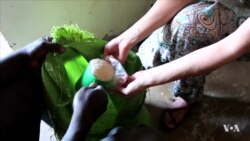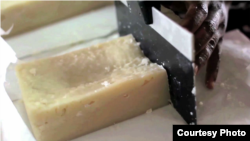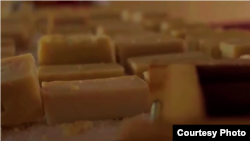As an American high school student, John Cefalu never imagined he would be in the business of creating entrepreneurs in Africa, but a trip to Kenya changed his worldview.
Cefalu was in Kenya on a service project, delivering school supplies and water filters to an orphanage. The lack of sanitation for the children and the future that awaited them bothered him.
It was "just the general lack of opportunity that a lot of these kids had, mainly in the high school graduate range, just struggling to find work," Cefalu said.
He wanted to do more to help the people he met, but the opportunity didn't arise until his first year in college. He was injured while playing football for his college team. Unable to play, he spent his free time developing a plan to help.
Cefalu created the nonprofit organization Health 2 Humanity. Now in its third year, the organization identifies people who would be a good match for its program, trains them to start a business, teaches them skills to make sanitary products such as soap, and provides them with a short-term subsidy. The aim is to have entrepreneurs making and selling products to sustain themselves, providing affordable sanitary products, and creating jobs and economic growth. Health 2 Humanity operates from 12 locations in Kenya, Ghana and Uganda.
Cefalu said many of the people in Health 2 Humanity's program not only take pride in running their own businesses, but also feel responsible for creating change within their communities.
"We're seeing jobs created. We're seeing illness rates being decreased. We're seeing overall awareness of hygiene products being implemented into these communities. We're seeing just overall self-value and self-worth — something about holding on to your own business and having your own opportunity and providing for yourself," Cefalu said.
Hezron's dream
Hezron Njeri grew up in central Kenya and dreamed of being a manager of a business, a hotel, anything. He never imagined an American college student would not only make his dream possible, but also create change within his community.
"When Health 2 Humanity came to Kenya, I noticed that this is my opportunity now to become a manager that I've been dreaming to be and also to work with the community — to work with the children which is my passion ... seeing that they're healthy, in good condition and also encouraging them and giving hope about life and their future," said Njeri, who started his own soap manufacturing and sales business. He was so good at his business that Health 2 Humanity tapped him to head up its implementation program. Now, Njeri helps other people become entrepreneurs.
Children are dear to Njeri's heart because he grew up in an orphanage after his mother died. He said his vision is to be able to affect people's lives and that Health 2 Humanity has allowed him to realize that goal.
"I've grown up without parents, and have been living as a testimony and also as an empowerment," Njeri said. "I can empower people through what I've gone through."
Cefalu said, "There's so much hidden talent and hidden passion out there in all of these different places from Kenya, Ghana, Uganda, here in our own backyard. There's so much hidden potential that just can't be utilized because of the fact there's no opportunity."
Not just another charity
Cefalu said Health 2 Humanity is different from many of the nonprofit organizations working in Africa because it is not just a charity.
"It's so much easier these days to go out and get a handout for whatever it is that you want to receive than it is to actually go into a program to develop yourself to get it on your own," he said. "We want to make sure that people are able to develop."
Cori Maass, Health 2 Humanity's marketing director, said there's a culture in Africa "that has been created of just ... receiving from Americans or from Europeans. It was a little bit disheartening just to see what charity has created there, with people not necessarily believing in themselves to help their community and help their situation." That kind of charity work, Maass added, is not sustainable.
On average, it costs $10,000 to establish a soap-making microbusiness in Africa, built to last 10 to 20 years, said Cefalu. The money goes toward purchasing raw materials and subsidizing the entrepreneur.
Cefalu said the Health 2 Humanity model is evolving. To fund the program, Cefalu and his team sell soap made in the U.S. to American consumers. Half of the proceeds are plowed back into the business and half go toward funding his nonprofit organization, which is also supported through individual donations.
Only option
Cefalu said most of the entrepreneurs helped by Health 2 Humanity have never had any work experience. Many of them lack education and live in places that offer no job opportunities, so entrepreneurship is the only option.
"We found that the people we're training, the people that are part of our program, the people that we're working with on a daily basis, they're almost revered as community leaders," he said. "They're looked up to because they're not looking out for just themselves. They want to bring the community under their wing and create awareness and make their lives better."
Cefalu said his entrepreneurs get more than just financial security. They also develop a sense of pride and desire to help others. He hopes to expand Health 2 Humanity's reach to Latin America and Asia.








